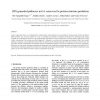Free Online Productivity Tools
i2Speak
i2Symbol
i2OCR
iTex2Img
iWeb2Print
iWeb2Shot
i2Type
iPdf2Split
iPdf2Merge
i2Bopomofo
i2Arabic
i2Style
i2Image
i2PDF
iLatex2Rtf
Sci2ools
115
click to vote
IJON
2010
2010
DFS-generated pathways in GA crossover for protein structure prediction
Genetic Algorithms (GAs), as nondeterministic conformational search techniques, are promising for solving protein structure prediction (PSP) problems. The crossover operator of a GA can underpin the formation of potential conformations by exchanging and sharing potential sub-conformations. However, as the optimum PSP conformation is usually compact, the crossover operation may result in many invalid conformations (by having non-self-avoiding-walk). Although a crossover-based converging conformation suffers from limited pathways, combining it with depth-first search (DFS) can partially reveal potential pathways and make an invalid crossover valid and successful. Random conformations are frequently applied for maintaining diversity as well as for initialization in many GA applications. Random-move-only-based conformation generator has exponential time complexity in generating random conformations, whereas the DFS based random conformation generator has linear time complexity and perform...
| Added | 05 Mar 2011 |
| Updated | 05 Mar 2011 |
| Type | Journal |
| Year | 2010 |
| Where | IJON |
| Authors | Tamjidul Hoque, Madhu Chetty, Andrew Lewis, Abdul Sattar, Vicky M. Avery |
Comments (0)

